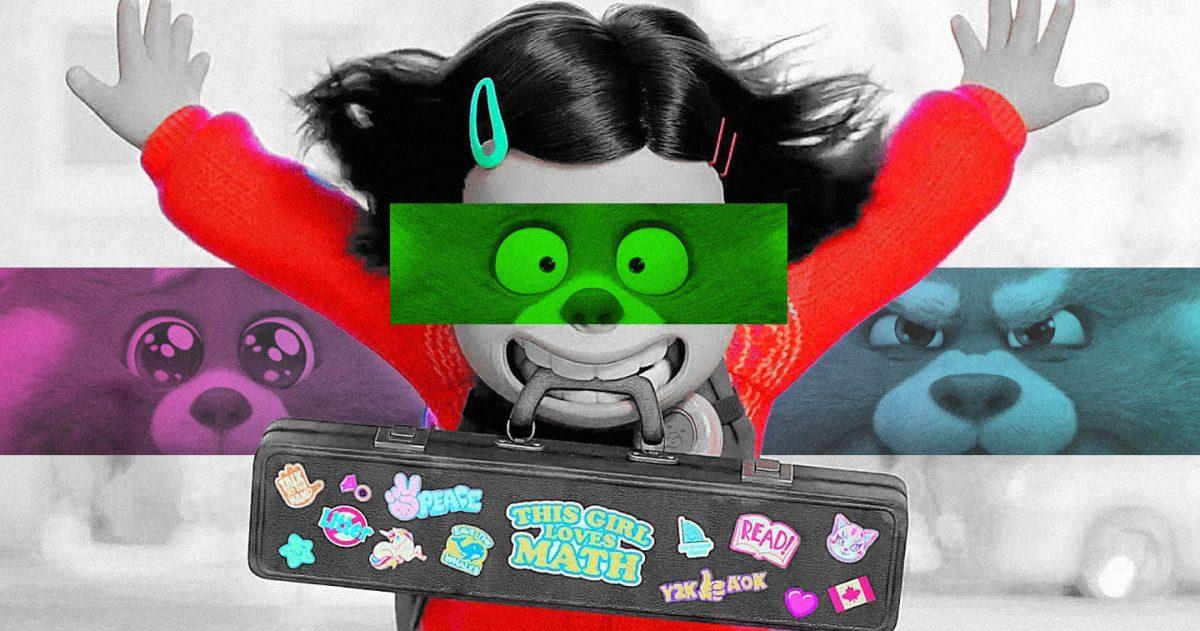MANILA, PHILIPPINES — The idea of a “tiger mom” has been the subject of much analysis over the past few years. This concept of strict parenting where a mom is very invested in a child’s success is often associated with Asian moms most of all. These mothers will do anything to ensure that their child will surpass their own success, even if it means they’ll be suffocating the child in the process. It’s a fascinating concept and it’s even more fascinating to see it tackled in animated form in Disney and Pixar’s Turning Red.
Thirteen-year-old Chinese-Canadian Meilin Lee (Rosalie Chiang) is a model student at her Toronto school in 2002. When at home, she helps her parents Jin (Orion Lee) and Ming (Sandra Oh) run their local Buddhist temple dedicated to their ancestor, Sun Yee. At school, she maintains excellent grades while hanging with friends Miriam (Ava Morse), Priya (Maitreyi Ramakrishnan), and Abby (Hyein Park).
The girls are determined to watch their favorite boy band 4*Town despite the expensive ticket prices. When Mei falls asleep one night, she’s shocked to find out she has turned into a giant red panda. Mei panics but figures out that if she stays calm, she can turn human again.
Ming, however, follows Mei to school and sees her lose control to turn into the panda. When Mei runs all the way home, Ming and Jin reveal to Mei the family secret. In ancient times, Sun Yee was granted the ability to transform into a red panda to defend her family. Every female member of the family has since inherited this ability.
Shocked by this revelation, Mei learns that she can be cured of her condition on the night of a Red Moon. When Mei’s friends discover her secret, they actually enjoy having the panda around. In fact, the panda can help them raise money to attend the 4*Town concert unless Ming stops them.
Director Domee Shi makes her feature directorial debut with this tale partially inspired by her own personal experience of being raised in Canada by Chinese parents. After she won Best Animated Short Film at the 91st Academy Awards for Bao, Shi makes history again by being the first woman to direct a Pixar film.
Turning Red has themes that will likely resonate with audiences worldwide, but particularly with Asian audiences. Many of us have parents who have tried controlling us at some point because they really want us to succeed. They’re often unaware that they’re not giving their children room to breathe and grow into their own person.
Just as Ming unknowingly overprotects Mei, so was she overprotected by her own mother Wu (Wai Ching Ho). Their relationship has been uneasy ever since, leaving both women unsure about how to deal with the other despite genuinely caring about their family. This generational story leads to an event during the film’s climax that although somewhat predictable eventually leads to resolution.
Even as the mothers in the family pass the abilities of the red panda to their daughters, they also inevitably pass their own insecurities and unresolved fears to the next generation. Thus, when Mei decides to keep her panda rather than be separated from the beast, her self-discovery and comfort in her own skin/fur makes her more mature than those older than her.
Aside from being the first Disney/Pixar movie set entirely in Canada, Turning Red also manages to talk about some sensitive topics, albeit in a humorous light. When Mei first turns into the red panda, her parents think that she has gotten her first period and proceed to treat it as such. It was a brave yet enlightened move by Shi and co-writer Julia Cho to introduce something that all adolescent girls go through.
The film also captures the immigrant story of a family leaving China for Canada. In Mei’s friends, we see how diverse Canada truly is. It’s normal there for kids of Chinese, Caucasian, Indian, Korean, and other backgrounds to intermingle. They enjoy the same music and have the same crushes like any group of teenagers would anywhere else in the world.
While Oh is Korean while most of the cast are Chinese, they all seamlessly sound like a family that has its ups and downs like other Asian families do. The overprotective and overbearing Ming is the quintessential tiger mom raised to the highest degree, allowing Disney’s audiences in Asia to see faces and stories they can relate to more than two decades after Mulan was released.
Perhaps the most surprising thing about Turning Red is the music aspect. International pop superstar Billie Eilish and her brother Finneas O’Connell wrote three original songs for 4*Town to perform. Ludwig Goransson, the man who composed scores for Star Wars shows The Mandalorian and The Book of Boba Fett did his first animated film score for this film.








